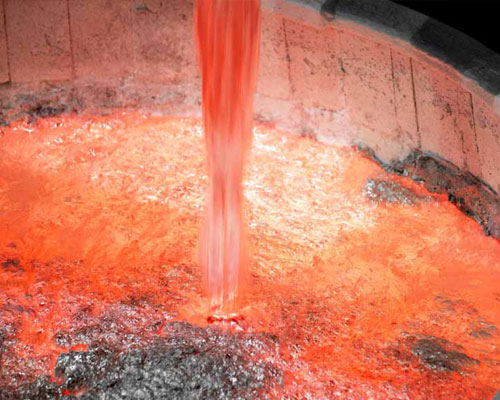Aluminium Purification Treatment is to obtain a clean, pure and homogeneous melt. The hydrogen content and slag content of the melt will affect the quality of the ingot. Therefore, we take the following measures to improve the quality of the smelting:
① During the smelting process, control the melt temperature between 720℃ ~ 760℃, and the furnace temperature control ≤ 1150℃. When the charge is melted, the temperature of the melt is measured in time, and the slagging is carried out in time within the control range of the melt temperature. Prevent the melt from obstructing normal heat radiation due to slag and causing local overheating.
②Sprinkle flux evenly into the furnace before slagging. The slagging must be stable, and the melt must not be pushed into the waves. After slagging, no large scum is visible on the surface. After slagging, the Mg ingot is added. The temperature of the Mg ingot is controlled at 730℃ ~ 750℃ to reduce the chance of oxidation and gas absorption of the melt.
③Add covering flux while adding Mg ingot to prevent Mg ingot from burning. After the Mg ingot is added, it needs to be kept for 30 minutes. After the incubation is completed, the melt needs to be stirred for 5 to 10 minutes. When the Mg ingot is added ≥ 50Kg, it needs to be stirred once more. The interval between two stirrings is not less than 15 minutes. Ensure that a homogeneous melt is obtained.
Sampling
On-site sampling must be representative, otherwise the ingot will be scrapped and returned to the furnace due to unqualified ingredients. When sampling, the sampling spoon must be fully dried, and the sample mold brush must be evenly painted with a layer of boron nitride coating. Metal before sampling Sampling is carried out after the sampling spoon is cleaned by the melt, and the sampling position is the middle depth of the melt in the 1/4 symmetrical zone in the longitudinal direction of the furnace.

Aluminium Purification Treatment
AdTech degassing device is used for degassing and slagging, and double rotors are used for degassing. The rotor uses two kinds of gases, argon and nitrogen. During the casting process, it is necessary to judge whether the rotor pores are unblocked by the gas pressure. In particular, it is necessary to check whether the gas lock of the degassing device is normal. Damage will cause a large amount of air to enter the cavity, causing the melt to oxidize and slag.
CFF is used to filter molten aluminum, and the following two points should be noted:
Preheat the filter box and filter plate uniformly to make them close to the temperature of molten aluminum, and the preheat temperature of the filter plate is not less than 260°C. Preheating to remove adsorbed water helps to open the initial filter pore size instantly, and prevents thermal expansion and contraction from causing blockage of the filter plate. Electric or gas heating can be used for preheating. Normal heating is 15-30 minutes.
During the normal filtering process, avoid knocking or shaking the filter plate. At the same time, the launder should be filled with molten aluminum to avoid excessive or small disturbance of the molten aluminum.

